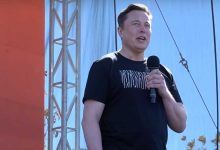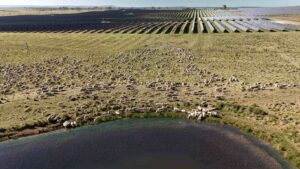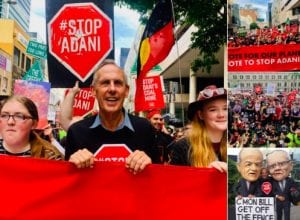Electric vehicle company Tesla on Wednesday fell short of the widely anticipated “million mile battery”, but the gains in costs and efficiency that it did unveil seem certain to trigger some $30 trillion of investment in electric vehicle infrastructure and accelerate the shift from petrol and diesel cars.
“Time really matters. It is really important we take action,” CEO and co-founder Elon Musk told the Battery Day event, presented before an audience seated in a car park full of Tesla EVs honking their approval, and an online audience estimated at up to half a million.
“We need to make more EVs, and we need to make them affordable,” Musk said. He added that the company, which is already valued at around $US400 billion despite making only half a million EVs a year, aims to make 20 million a year and also promised a $US25,000 electric vehicle within three years that will be fully autonomous and cheaper than its fossil fuel rivals.
Tesla stock was marked down because of the failure to deliver the much hoped for “million-mile battery”, and because the promised battery gains that were announced could take three years to become reality. But what Musk and his team did unveil was still highly significant.

A series of battery innovations along the production scale was announced that will deliver a halving in costs, and a 54 per cent improvement in range, but also a shift by Tesla to become an even more vertically integrated company, including mining its own lithium in Nevada and making its own cells.
Analysts say that Tesla is so far ahead of the rest of the industry they will have to spend trillions to catch up. Tesla’s market value reflects that – it is now worth more than all the other big car makers combined despite producing only a fraction of their volume.
Morgan Stanley estimates that the Battery Day revelations could trigger a global investment spend of $US22 trillion ($A30.5 trillion) in the “EV ecosystem” to help fund the decarbonisation of the global transport fleet, including nearly $US10 trillion in batteries themselves, $US4.3 trillion in manufacturing plants, $US4.1 trillion for EV powertrains and $3.6 trillion in EV and grid infrastructure, such as charging stations.
“Tesla cannot do it alone,” Morgan Stanley analysts said. “They will need the help (and the spending) of many other players in the EV/battery ecosystem.”
And that was exactly the message from Tesla and Musk. They intend to lead, becoming a fully integrated manufacturing company, cutting out the middlemen at so many levels – from mining, to cell production, and investing in new refining processes to cut the costs of battery components.
And the language from Musk and his team was the polar opposite of what we Australia hears from its federal government and leading business lobbies. Just this week, the Australian government refused to announce a long-term climate target saying it did not want to suppress the economy.
Musk dismisses such arguments as bunkum. “It’s a false dichotomy,” he said, to suggest that sustainability only comes with economic sacrifices. “Sustainable energy is going to be lower cost, not higher cost than fossil fuels.”
And Musk is confident that those fossil fuels will be a thing of the past, thanks to the huge steps made in battery storage technology. “Over time we will see all modes of transport becoming fully electric,” he said, with the notable exception of rockets such as the ones he has planned for Mars.
There will be some niche fossil fuel curios, like there are still steam trains, but that’s about it. “There are some steam engines made somewhere, they are quirky collectors’ items. That will be the future of the internal combustion car,” he said.
Morgan Stanley estimates that batteries for EV production will surpass 1.4 terawatt-hours by 2040 and 3.1 TWh by 2050, equivalent to nearly 100 Tesla Nevada gigafactories.
Tesla says it will be way above that. It now forecasts 3 terawatt-hours of battery storage production capacity by 2030, and it expects the world will need 10TWh of battery storage for cars and other road transport, and another 10TWh for the grid, to transform it into 100 per cent renewables.
 And while the million-mile battery did not appear, Musk said that the company had succeeded in changing the trajectory, although there were no hard numbers (see graph above). The market is hoping to see a number less than $100/kWh.
And while the million-mile battery did not appear, Musk said that the company had succeeded in changing the trajectory, although there were no hard numbers (see graph above). The market is hoping to see a number less than $100/kWh.
“We are confident we can design and make a $US25,000 electric vehicle … that will cost less than combustion equivalents and is also fully autonomous” Musk said. “This has always been the dream of our company.”
(Please go to our electric vehicle sister site The Driven to read more details.)
That is about three years away, and some are already calling it the Model 2 (although Tesla has not given it a name). By which time the million-mile battery may have appeared, and Tesla will be building not just giga-factories but tera-factories, equipped with the battery technology that makes better use of raw materials, and requires less floor space.
It all comes down to the need to act, heightened in California by the bushfires that were a major feature of its introductory video at the event. “It is an absolutely monumental task to accelerate to clean energy. Time really matters. It is really important we take action … we need to make more EVs and we need to make them affordable,” Musk said.
And while the world looks to spend trillions on transforming the grid, and the car fleet, Australia has limited itself to an $18 billion spend over 10 years – much of it on technologies that support legacy fossil fuel technologies such as carbon capture and storage and blue hydrogen. It has allocated just $64 million to EV charging infrastructure, and that includes biofuels and hydrogen fuel cells.






